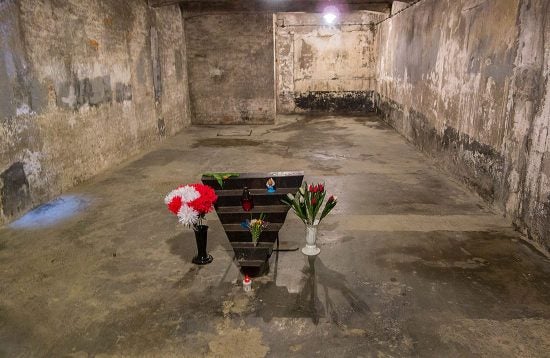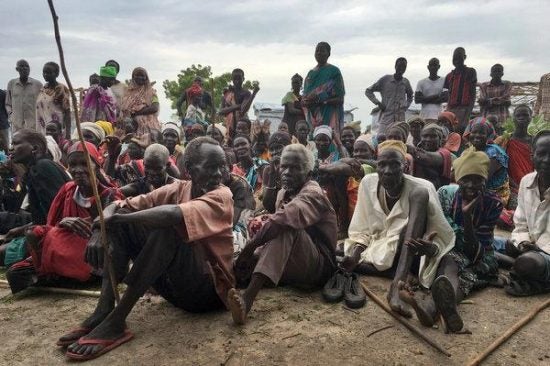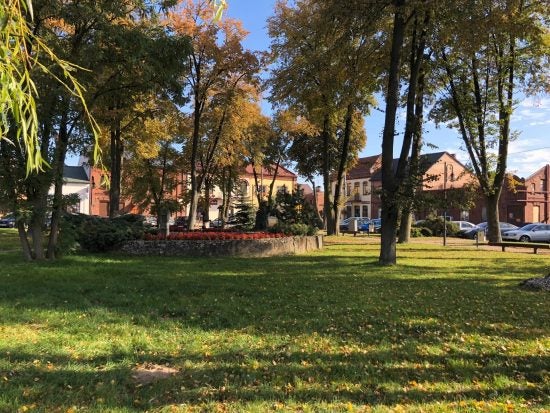
Chamber in Auschwitz where bodies of people killed in gas chamber were kept before being burned. Image courtesy of John Finn Photography.
From Auschwitz…
I write these words just after my parents visited Auschwitz, that place of murder and Mengele, torture and terror, starvation and slavery, whose very name will be forever synonymous with the depths of darkness into which humanity can descend. As my parents told me after their experience, being there makes one shudders at these almost unbelievable depths – almost unbelievable for if it did not happen, it would be unbelievable, but how it did happen. And it made them ask, equally (almost) unbelievably, how could anyone survive – much less maintain the will to survive – for even a single minute?
This the world well enough grasped in the Holocaust’s aftermath, and so pledged: Never Again. But as we all know, that sacred pledge has become more a rallying cry to demand action rather than a meaningful commitment to action. For instead of Never Again, it has been again. And again. And again. Never at the same scale, the same utter determination and immense operation to try to forever exterminate from the face of the earth an entire people numbering well into the millions. But still, again, and again, and again.
Again and again and again ideologies that dehumanize certain peoples have descended into violence at a horrific scale. Again and again and again governments (and more recently, also militias and rebels and insurgencies and terrorist movements) have committed atrocities of immense scale and overwhelming cruelty, killing babies in front of their mothers, employing mass rape as a weapon of war.
We see reminders of this (besides the 2018 Nobel Peace Prize, awarded to two campaigners against rape as a weapon of war) with the Burmese military’s genocide against the Rohingya, where the bravery of survivors, as well as intrepid activists, aid workers, and journalists, stands in sharp contrast to the timidity, meagerness of the global (including the U.S.) response — and, of course, in Syria, with more than half a million dead.
…to South Sudan…
The latest reminder comes from South Sudan. There, we recently learned the true scale of the killing.
The civil war in the world’s newest country erupted in late 2013. Conflicts of power between President Kiir and then-Vice President Macha – the former accused the latter of a coup plot – in a land of weak institutions, a lack of a democratic tradition, corruption, and oil, spiraled into an ethnically-tinged war, with the President (an ethnic Dinka) and Vice President (an ethnic Neur) mobilizing ethnically-based militias behind them.
By early 2014, we were hearing of the possibility of 10,000 people killed, and by early 2016, the toll was said to be 50,000.
And there it remained, tens of thousands of deaths, until late last month, at the tail end of September – as world leaders convened during the opening of the UN General Assembly session, where they are supposed to work for peace and human rights for all. Researchers at the London School of Hygiene and Tropical Medicine released a statistical analysis finding that the war is responsible for some 383,000 deaths (through April 2018), with about half directly attributable to the violence, and the other half to its consequences, including hunger and disrupted health care.

And they are the survivors….Image of displaced South Sudanese courtesy of Sam Mednick/Associated Press.
South Sudan is one of the world’s poorest and least developed countries. Yet even here, the might of the world has not stopped the killing. That is, the international community has chosen not to do what would be necessary to stop the murder and rape. Instead it has been one ceasefire and peace deal after another made, and one ceasefire and peace deal after another to fall to pieces. The most recent peace deal was signed only weeks before the London School study. Let us hope it holds, though experts give it little chance.
The inadequate UN peacekeeping force – long about 12,000 troops, with 4,000 more deployed in July 2017 – has, it seems, been more remarkable for its failures than its successes, though this is not to minimize the sacrifice of peacekeepers who have been killed during the UN Mission, nor the work of the many who have served honorably. The UN Security Council only mustered the political will – how much did it take? – to impose an arms embargo in July 2018; to its credit, the United States tried but failed to secure an embargo in 2016.
…to the possibilities of a different response….
What if we treat such atrocity-laden mass violence as a disease, an epidemic to be prevented and controlled and stopped? After all, such wars, rife with crimes against humanity – at times even genocide – are a disease. They are not a disease of microbes and parasites, tumors or bodily breakdowns, but of hatred and indifference, greed and manipulation, failures in compassion and imagination.
The idea of treating violence as a disease, an epidemic, is hardly new. A public health approach has much to offer a policy towards gun violence, with “impressive results” when taken.
In the case of mass violence and mass atrocities, we would first recognize that, at least in the current state of the world, the question is not if, but when. We would – like the Early Warning Project of the U.S. Holocaust Memorial and Museum – proactively keep watch for this possibility and invest in peace-building measures – from supporting local human rights and peace activists and institution-building to creating regimes of escalating targeted sanctions. We would have robust peacekeeping forces at the ready in case all else fails – or better, to prevent violence in the first place.
We would conduct rigorous surveillance. For an epidemic disease of the regular sort, such surveillance enables a timely, targeted response, minimizing any harm. For an epidemic of mass violence, similarly, the better we understand what is happening, the more informed, and thus effective, our response can be.
Surveillance has another critical function. It may build political will. True, perhaps it will not. We see so many dead in Syria. The world knows of genocide against the Rohingya. And in South Sudan, we have known that the death toll has been huge, even if believing it was almost an order of magnitude lower than it really was. Perhaps knowing the true toll will not make a difference. But just maybe, being less able to say “we didn’t know” will affect the political dynamics.
Not that surveillance will necessarily be easy. It may be difficult to gain access to conflict-ridden areas, and the dangers may be extreme; 113 humanitarian aid workers have been killed while serving as the lifeline to the people of South Sudan. Innovative methods – like that employed by the team at the London School – may well be needed. Perhaps technology, like satellite imagery, could help.
A smart response to epidemic diseases entails employing all available tools, from infection control and prevention, vector control, limiting the risks of animal-to-human transmission, and vaccination to prevent an epidemic to contact tracing, effective communication, enhanced laboratory and human capacity, and medication to contain and end it.
How far this is from our response to South Sudan. The under-capacitated peacekeeping force and immensely belated arms embargo are hardly the only ways in which the world failed to use all available tools. For example, the Enough Project identified four forms of financial pressures that could contain “violent kleptocratic networks” in Africa, including in South Sudan, the Democratic Republic of Congo, and the Central African Republic: 1) highly targeted and aggressively enforced sanctions; 2) anti-money-laundering tools; 3) asset recovery mechanisms, and 4); aggressively enforcing the Foreign Corrupt Practices Act. Yet “[t]he last three tools…have not yet been used in the service of peace and human rights in Africa,” and sanctions are poorly enforced. Meanwhile, the international community has met less than 50% of South Sudan’s humanitarian assistance needs. And where are the tools of international criminal justice, whether the International Criminal Court or the Hybrid Court for South Sudan, called for in the 2015 South Sudan peace agreement?
We also prepare for microbial epidemics through international financing mechanisms – prominently the Global Fund to Fight AIDS, Tuberculosis and Malaria, the GAVI Alliance (funding vaccinations), and the Coalition for Epidemic Preparedness Innovations (financing the development of new vaccines). What about a global peace-building fund to support local initiatives to prevent conflict?
Along with state action, a critical part of preventing epidemics comes from within – that capacity of our immune system to enable us to survive potentially deadly infections – whether thanks to vaccines or due to its own, unaided prowess. We need to build up our immune systems to resist the discrimination, scapegoating, exclusion, dehumanization, fear, and hatred that poison the soil in which mass atrocities grow and our humanity rots. We need to build our immunity to the perhaps still more lethal indifference to, or at least acceptance of or resignation to, mass violence, massacres, and the most horrific crimes.
…to what might have been…and what might yet be.
Everyone should visit Auschwitz, my parents said to me. Perhaps then people would better understand the consequences of discrimination and demonization – against Muslims in the United States and Europe, for example. Perhaps seeing with their own eyes where ideologies of hate, of difference, of us versus them, can lead, would change minds, hearts, and actions. And if not everyone can visit Auschwitz, at least everyone should come as near as possible – through education, through multimedia, through books, through interactions with survivors of hate.
After Auschwitz, my parents went to Zarnowiec, Bedzin, and Dabrowa, towns in Poland where my grandfather was born and grew up – before his entire family (other than a cousin who emigrated earlier) was murdered in the Holocaust, as was nearly the entire family of my grandmother. After both my grandparents ending up in Bergen-Belsen (a concentration camp in Germany) at war’s end, they would meet and marry as refugees in Sweden. My father is seeking to understand what his parents’ lives were like before their world was destroyed. And he is seeking to understand, or at least to imagine, what might have been, what paths his parents might have taken, how their lives might have turned out, had there been no Holocaust.
No son, daughter, should have to ask such “might have beens” about their parents. For all those who have and who do – including for the hundreds of thousands killed in South Sudan, and their families – for the sake of our own humanity – we must, and we can, do better. That is not asking for too much.

Town square of Zarnowiec, Poland, where my grandfather was born.



